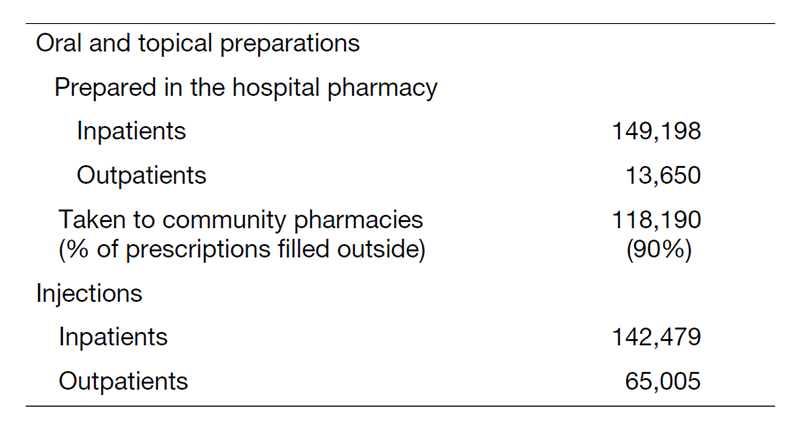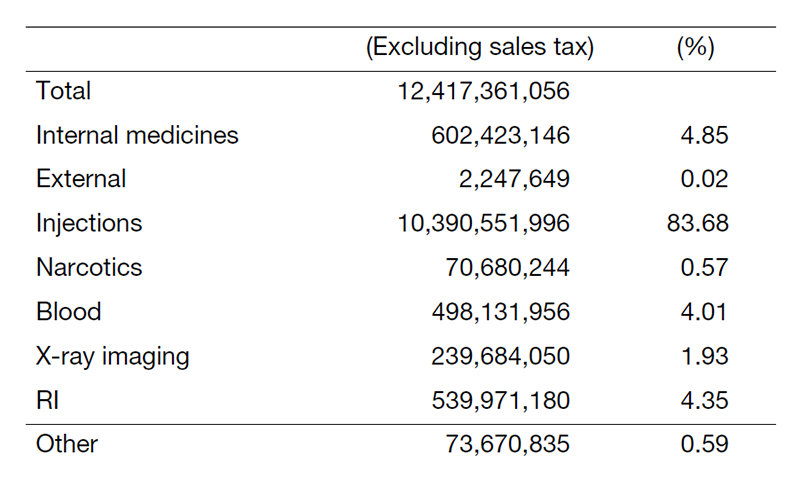Annual Report 2022
Department of Pharmacy
Hironobu Hashimoto
Introduction
The Department of Pharmacy stores and dispenses drugs, prepares injections (including aseptic mixtures), collects and disseminates drug information, and provides patients with guidance regarding the proper use of drugs. Its services have been improved toward the hospital’s goal of achieving the highest quality of medical care, practice, and research. A state-of-the-art computerized system and other pharmacy-related equipment ensure quality control and inventory management, promote the proper use of drugs, and enhance the efficiency and quality of our services.
The Team and What We Do
As part of the fundamental function of the hospital, the Department of Pharmacy prepares and dispenses oral and topical medicines and injections for individual patients (Table1, 2). All outpatients and inpatients are provided with aseptic mixtures of injectable chemotherapy agents prepared in our department (Table 3). As the importance of providing drug information for patients has been widely acknowledged, clinical pharmacists visit inpatients and provide advice on taking medicine, especially focusing on pain control with opioids, and participate in the palliative-care support team, while our department provides outpatients with guidance on the proper use of opioids and anti-cancer drugs. Our department also places pharmacists in every hospital ward to provide medication reconciliation services for inpatients, with the aim of enhancing the quality of chemotherapy and easing burdens on doctors and nurses. Pharmacists collect, compile, and maintain a database of drug information and distribute pertinent information to the medical staff. Drug information is immediately disseminated throughout the hospital by paper distribution and/or on the in-hospital computer network. Pharmacists individualize dosage regimens for specified drugs such as tacrolimus, teicoplanin, and vancomycin based on both measured blood concentrations and pharmacokinetic analysis to maximize their efficacy and minimize adverse events. A physician places an order through the hospital’s electronic medical record system. The prescription order is then redirected to the medicine-package-printing system, which provides drug information. Medicine-package information, instructions and explanations (which are easy to understand for patients so as to ensure the proper use of drugs, and include matters such as efficacy and effectiveness, precautions, and guidance concerning symptoms in the early stage of adverse reactions) are automatically printed out for patients when a prescription is ordered. The injection order is directly linked to an automatic “picking system” device, and this linkage ensures that injections are performed properly and efficiently. This injection-ordering system contains an additional function which is a regimen-ordering system for anti-cancer drugs that makes it possible to evaluate the dose and the interval of chemotherapy. The Department of Pharmacy also has a robot that prepares injection preparations without human assistance.
Table 1. Number of prescriptions in 2022

Table 2. Amount of drugs consumed in 2022

Table 3. Aseptic preparation of injectable drugs in 2022

Research Activities
As the important mission of the Department of Pharmacy is to contribute to the development of new drugs, inventory control and handling of new investigative drugs are performed in accordance with Good Clinical Practice regulations (Table 4). Research on the safety management of chemotherapy is conducted including handling of chemotherapeutic drugs, reduction of incidents regarding drugs, and improvement of pain control for patients who need palliative care through the use of guidance materials. A couple of studies on the pharmacokinetics and pharmacodynamics of cancer-related drugs have been performed and some results have been reported in international conferences and journals.
Table 4. Investigational drugs

Clinical Trials
We participated in a clinical trial on chemotherapy-induced nausea and vomiting. We developed a new antiemetic therapy that combines olanzapine (atypical antipsychotic) with standard antiemetic therapy for highly emetogenic chemotherapy in breast cancer patients. A protocol paper for this trial was published in 2021.
Education
The National Cancer Center Hospital offers a three-year postgraduate pharmacy residency training program in clinical oncology. In the first year, the program places the greatest importance on the technical aspects of cancer care. In the second year, through required rotations in a variety of focused hematology/oncology services, residents will refine their clinical problem-solving skills in cancer management and patient education, provide pharmaceutical care to ambulatory care patients, and participate in an oncology-focused Drug Information Program. In the third year, residents participate in specialized pharmaco-clinical practice and research activities, which may be tailored to their goals. The hospital also provides a two-year chief residency program in which post-residency trainees may develop their clinical research capabilities to a higher level. Moreover, there are opportunities for educational activities, such as a training course for visiting expert pharmacists and post-graduate students of pharmacy, and participation in a multi-institutional TV conference.
Future Prospects
To provide the best cancer care, the Department of Pharmacy will promote "the best cancer treatments", "developing and spreading of new treatments", "educating young pharmacists for oncology", and "providing information to domestic and overseas organizations".
List of papers published in 2022
Journal
1. Fujiwara Y, Makihara R, Hase T, Hashimoto N, Naito T, Tsubata Y, Okuno T, Takahashi T, Kobayashi H, Shinno Y, Zenke Y, Ikeda T, Hosomi Y, Watanabe K, Kitazono S, Sakiyama N, Makino Y, Yamamoto N. Pharmacokinetic and dose-finding study of osimertinib in patients with impaired renal function and low body weight. Cancer science, 114:2087-2097, 2023
2. Saito Y, Shimoi T, Iwata S, Maejima A, Abe K, Udagawa R, Yonemori K, Furukawa T, Wakao F. Impact of relative dose intensity of trabectedin with pegfilgrastim support: a single-centre retrospective study. Journal of chemotherapy (Florence, Italy), 1-8, 2023
3. Mano Y, Abe K, Takahashi M, Higurashi T, Kawano Y, Miyazaki S, Maeda-Minami A. Optimal Administration of Glycyrrhizin Avoids Pharmacokinetic Interactions With High-dose Methotrexate and Exerts a Hepatoprotective Effect. Anticancer research, 43:1493-1501, 2023
4. Kubo E, Ishiki H, Abe K, Kaku S, Yokota S, Arakawa S, Kiuchi D, Amano K, Satomi E. Clinical role and safety of tapentadol in patients with cancer: A single-center experience. Journal of opioid management, 18:273-280, 2022
5. Kitazume Y, Kawazoe H, Uozumi R, Yoshizawa T, Iihara H, Fujii H, Takahashi M, Arai T, Murachi Y, Sato Y, Mikami T, Hashiguchi K, Yamazaki T, Takahashi K, Fujita Y, Hosokawa Y, Morozumi I, Tsuchiya M, Yokoyama A, Hashimoto H, Yamaguchi M. Proton pump inhibitors affect capecitabine efficacy in patients with stage II-III colorectal cancer: a multicenter retrospective study. Scientific reports, 12:6561, 2022
6. Yamazaki T, Uozumi R, Kawazoe H, Kitazume Y, Iihara H, Fujii H, Takahashi M, Arai T, Murachi Y, Sato Y, Mikami T, Hashiguchi K, Yoshizawa T, Takahashi K, Fujita Y, Hosokawa Y, Morozumi I, Tsuchiya M, Yokoyama A, Hashimoto H, Furukawa T. Association between the Co-administration of Histamine H(2) Receptor Antagonists and the Effectiveness of Capecitabine in Patients with Colorectal Cancer: Propensity Score Analysis. Journal of Cancer, 13:3073-3083, 2022
7. Tashiro R, Kawazoe H, Mamishin K, Seto K, Udagawa R, Saito Y, Hashimoto H, Shimoi T, Yonemori K, Yonemura M, Terakado H, Kawasaki T, Furukawa T, Nakamura T. Patient-associated risk factors for severe anemia in patients with advanced ovarian or breast cancer receiving olaparib monotherapy: A multicenter retrospective study. Frontiers in oncology, 12:898150, 2022
